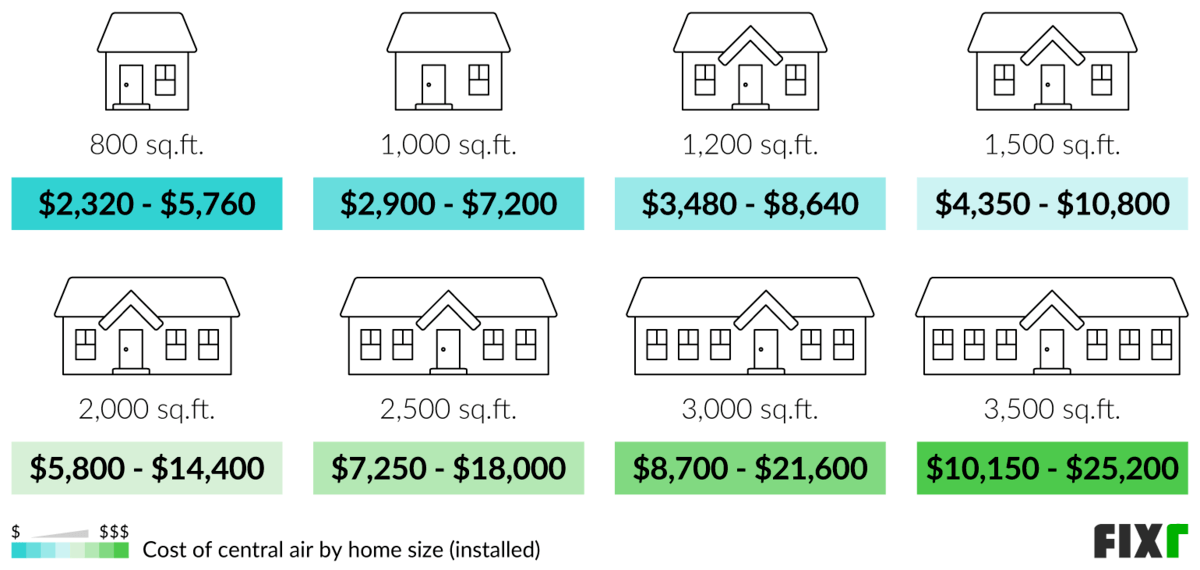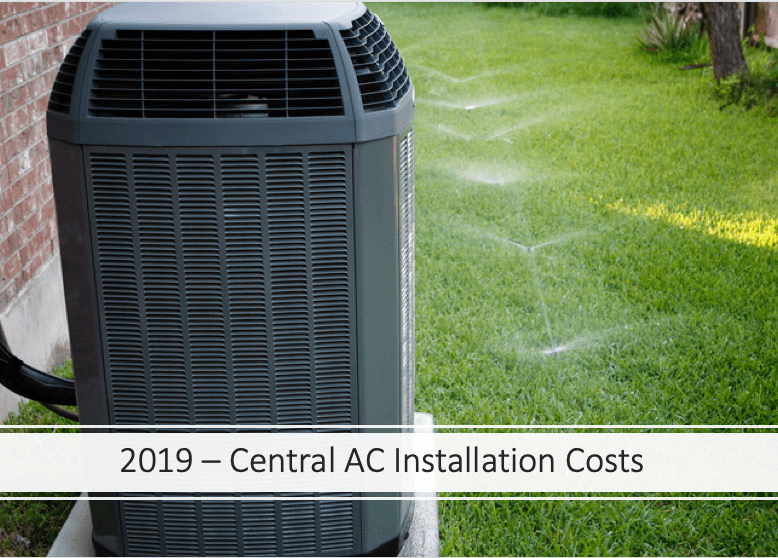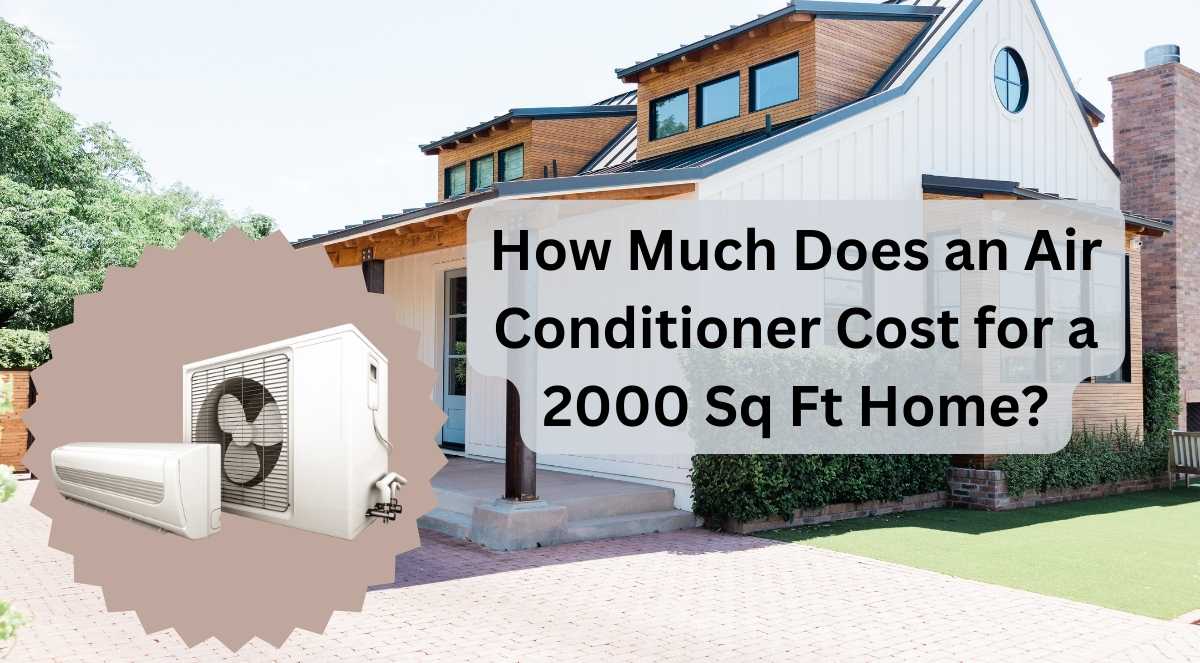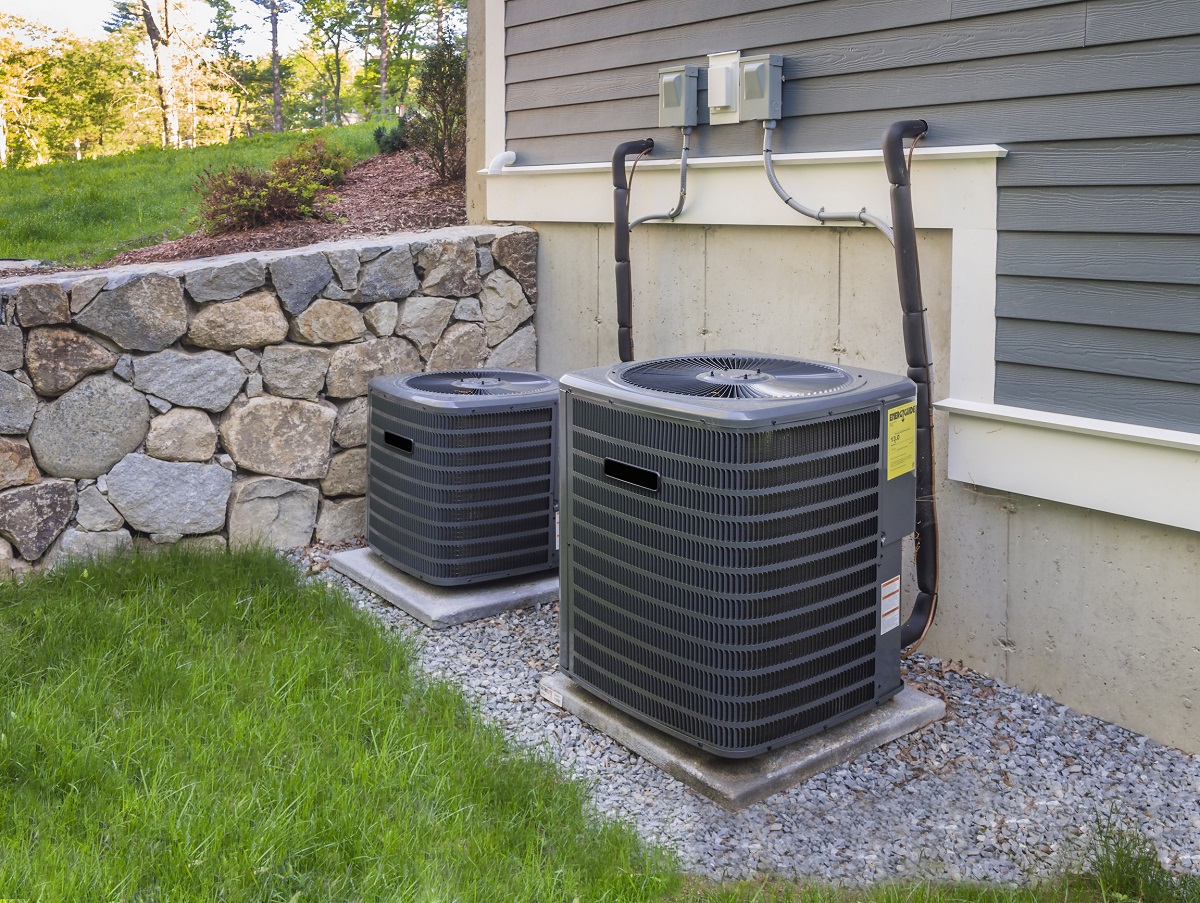Cost Of Central Air For 2000 Sq Ft House
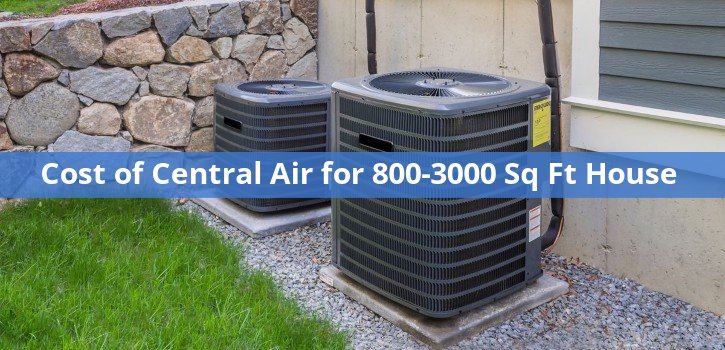
Frequently Asked Questions: Cost of Central Air Conditioning for a 2000 Sq Ft House
Installing central air conditioning is a significant investment, and it's natural to have questions about the costs involved. This FAQ aims to provide clear and concise answers to help you understand the factors that influence the price of a central AC system for a 2000 square foot home.
Question 1: What is the average cost to install central air conditioning in a 2000 sq ft house?
The average cost to install a new central air conditioning system in a 2000 sq ft house typically ranges from $4,000 to $12,000. This includes the cost of the AC unit itself, labor for installation, and any necessary ductwork modifications or additions. However, this is a wide range, and the actual cost can vary based on several factors.
Here's a breakdown of the primary components that contribute to the overall cost:
- AC Unit Price: This is the most significant expense. The price depends on the SEER rating (Seasonal Energy Efficiency Ratio), brand, and cooling capacity (measured in BTUs).
- Installation Labor: Hiring a qualified HVAC contractor is essential. Labor costs can vary based on your location and the complexity of the installation.
- Ductwork: If your home doesn't have existing ductwork or if the existing ductwork needs modifications or repairs, this will add to the overall cost.
- Permits and Inspections: Local building codes often require permits and inspections for HVAC installations, adding a small fee to the project.
- Optional Upgrades: Features like smart thermostats or zoning systems can increase the price.
Question 2: What factors influence the total cost of a central AC installation?
Several key factors can significantly impact the cost of installing central air conditioning. Understanding these factors will help you get a more accurate estimate.
- SEER Rating: A higher SEER rating indicates greater energy efficiency. While units with higher SEER ratings typically cost more upfront, they can save you money on your energy bills in the long run. SEER ratings usually range from 13 to 25. Aim for at least a 16 SEER rating for good efficiency.
- BTU (British Thermal Units) Rating: BTU rating indicates the cooling capacity of the AC unit. A 2000 sq ft house typically requires a unit with 30,000 to 40,000 BTUs, but this can vary based on factors like insulation, window size, and sun exposure. Oversizing or undersizing the unit will impact efficiency and comfort.
- Brand and Model: Different brands offer varying levels of quality, features, and warranties. Well-known brands like Carrier, Trane, and Lennox often come with higher price tags but may offer greater reliability and longevity.
- Existing Ductwork: The condition and suitability of your existing ductwork significantly affect the installation cost. If the ductwork is old, damaged, or poorly designed, it may need to be repaired, replaced, or modified. This can add substantially to the overall cost.
- Installation Complexity: The complexity of the installation process also plays a role. Factors like the accessibility of the installation location (e.g., attic, crawl space), the need for electrical upgrades, and the difficulty of running refrigerant lines can all increase labor costs.
- Location: Labor costs and permit fees vary depending on your geographic location. Areas with a higher cost of living generally have higher HVAC installation costs.
- Contractor: Different HVAC contractors have different pricing structures and overhead costs. It's crucial to get quotes from multiple contractors to compare prices and services. Ensure that the contractor is licensed, insured, and has a good reputation.
- Home Insulation: Proper insulation significantly impacts the efficiency of your AC system. If your home is poorly insulated, you'll need a larger AC unit to achieve the desired cooling, increasing the initial cost. Improving insulation can also help you save money on energy bills in the long run.
Question 3: Should I repair my existing AC or replace it entirely?
Deciding whether to repair or replace your existing AC unit depends on several factors, including the age of the unit, the extent of the repairs needed, and the overall cost-effectiveness of each option.
Consider replacement if:
- The unit is 10-15 years old or older: Older units are less energy-efficient and more prone to breakdowns.
- Repairs are frequent and costly: If you're constantly spending money on repairs, it might be more economical to invest in a new, more reliable unit.
- The unit uses R-22 refrigerant: R-22 refrigerant is being phased out, making it increasingly expensive and difficult to obtain. If your unit uses R-22, replacement is a good option.
- Energy bills are high: An older, less efficient unit will consume more energy, resulting in higher energy bills. A new, high-efficiency unit can significantly reduce your energy consumption.
- You want to improve energy efficiency: Newer AC units have higher SEER ratings, making them more energy-efficient and environmentally friendly.
Repair might be a viable option if:
- The unit is relatively new (less than 10 years old): If your unit is relatively new and the repairs are minor, repairing it might be the more cost-effective option.
- The repairs are infrequent and inexpensive: If the repairs are relatively infrequent and the cost is low, repairing the unit might be a reasonable solution.
It's always a good idea to get a professional opinion from an HVAC technician. They can assess the condition of your unit and provide recommendations based on your specific situation.
Question 4: What size AC unit do I need for a 2000 sq ft house?
Determining the correct size AC unit is crucial for optimal performance and energy efficiency. The size of an AC unit is measured in BTUs (British Thermal Units). For a 2000 sq ft house, you'll typically need an AC unit with a cooling capacity of 30,000 to 40,000 BTUs. This translates to 2.5 to 3.5 tons (1 ton = 12,000 BTUs).
However, several factors can influence the ideal BTU rating:
- Climate: Homes in hotter climates will require larger AC units than those in cooler climates.
- Insulation: Well-insulated homes require smaller AC units.
- Window Size and Orientation: Homes with large windows or windows facing south or west will require larger AC units.
- Ceiling Height: Higher ceilings increase the volume of air to be cooled, requiring a larger AC unit.
- Number of Occupants: More occupants generate more heat, requiring a larger AC unit.
- Sun Exposure: Homes with significant sun exposure will require larger AC units.
It's best to consult with an HVAC professional to perform a load calculation. This calculation takes into account all of the factors mentioned above to determine the precise BTU rating needed for your home.
Question 5: Are there any rebates or incentives available to help offset the cost?
Yes, there are often rebates and incentives available from various sources to help offset the cost of installing a new, energy-efficient central AC system. These incentives can significantly reduce your upfront costs.
Here are some common sources of rebates and incentives:
- Federal Tax Credits: The federal government may offer tax credits for purchasing energy-efficient HVAC equipment. Check the IRS website for the latest information.
- State and Local Rebates: Many state and local governments offer rebates for installing energy-efficient appliances, including central AC systems. Check your state's energy efficiency program website.
- Utility Company Rebates: Your local utility company may offer rebates for purchasing and installing energy-efficient HVAC equipment. Contact your utility company to inquire about available rebates.
- Manufacturer Rebates: Some AC manufacturers offer rebates on specific models. Check the manufacturer's website or ask your HVAC contractor about available rebates.
Be sure to research available rebates and incentives before purchasing your new AC system. Your HVAC contractor can also help you identify and apply for any eligible rebates.
Question 6: How can I save money on central AC installation?
Installing central air conditioning can be a significant expense, but there are several ways to potentially save money without compromising the quality or performance of the system.
- Get Multiple Quotes: Obtain quotes from at least three different HVAC contractors. Compare the prices, services, and warranties offered by each contractor. Don't automatically choose the lowest bid; consider the contractor's reputation and experience.
- Choose the Right Size Unit: Avoid oversizing or undersizing the AC unit. Oversized units are less efficient and can lead to higher energy bills. Undersized units won't adequately cool your home. Have an HVAC professional perform a load calculation to determine the correct size unit for your home.
- Consider a Lower SEER Rating: While higher SEER ratings offer greater energy efficiency, they also come with a higher price tag. If you're on a tight budget, consider a unit with a slightly lower SEER rating. A 16 SEER unit is generally considered a good balance of cost and efficiency.
- Maintain Your Existing Ductwork: If your existing ductwork is in good condition, avoid replacing it unnecessarily. Repair any leaks or damage to improve efficiency.
- Schedule Installation During Off-Season: HVAC contractors may offer lower prices during the off-season (fall and winter) when demand is lower.
- Ask About Financing Options: Some HVAC contractors offer financing options to help you spread out the cost of the installation.
- Take Advantage of Rebates and Incentives: As mentioned earlier, rebates and incentives can significantly reduce the cost of the installation.
- Improve Home Insulation: Proper insulation can reduce the cooling load on your AC system, allowing you to choose a smaller, less expensive unit.
Question 7: How long does a central AC system typically last?
The lifespan of a central AC system typically ranges from 15 to 20 years, depending on several factors, including the quality of the unit, the frequency of maintenance, and the operating conditions.
Here are some tips to extend the lifespan of your central AC system:
- Regular Maintenance: Schedule regular maintenance with a qualified HVAC technician. This includes cleaning the coils, checking the refrigerant levels, and inspecting the components for wear and tear.
- Change Air Filters Regularly: Dirty air filters restrict airflow, reducing efficiency and putting stress on the system. Change your air filters every 1-3 months, depending on the type of filter and the amount of dust in your home.
- Keep Outdoor Unit Clean: Keep the outdoor unit free of debris, such as leaves, grass clippings, and branches. This will ensure proper airflow and prevent overheating.
- Use a Programmable Thermostat: A programmable thermostat can help you save energy by automatically adjusting the temperature when you're away or asleep.
- Avoid Extreme Temperature Settings: Setting the thermostat too low can put unnecessary stress on the system and shorten its lifespan.
- Address Problems Promptly: If you notice any problems with your AC system, such as unusual noises or reduced cooling, address them promptly to prevent further damage.
By following these tips, you can maximize the lifespan of your central AC system and ensure that it operates efficiently for many years to come.

